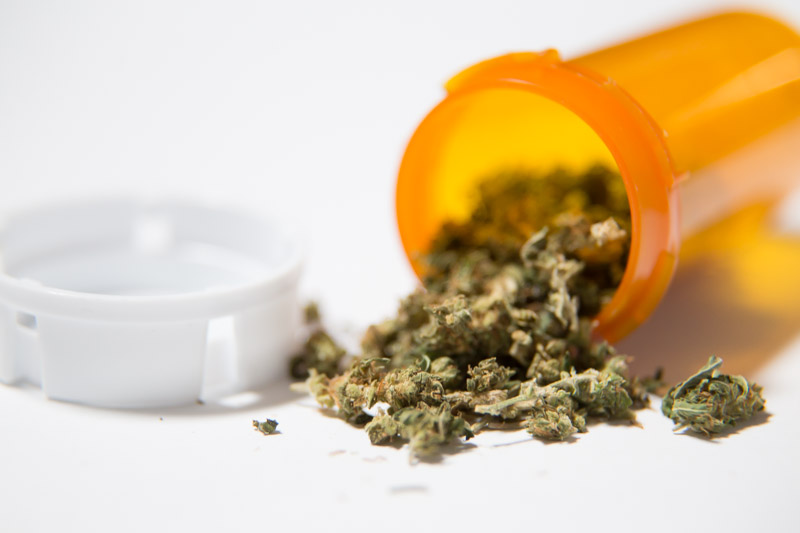
If not for the gold cannabis leaf pinned to his suit lapel, Weinberg junior Rex Tai would have looked like a delegate at a Model U.N. conference or a student at a career fair.
The occasion for his formal attire was the 2014 Students for Sensible Drug Policy (SSDP) Midwest Regional Conference on April 12, hosted by Northwestern’s SSDP chapter, of which Tai is co-president. From 10 a.m. to 7 p.m., students, medical professionals, lobbyists and policy analysts crowded around Harris Hall L07 and University Hall 122 for a day of discussion about alternatives to drug prohibition.
Of the handful of panel-led sessions, one called “Medical Marijuana in the Midwest” highlighted an irony in medical marijuana policy: Its discussion of Illinois’ medical marijuana program took place on university grounds, where marijuana – both medical and recreational – is still illegal under federal law.
On April 18, Illinois regulators released the first draft of rules for the state's medical marijuana program, formally called the Compassionate Use of Medical Cannabis Pilot Program. These rules outline the qualifying conditions necessary for patients, caregivers and state-regulated dispensaries to obtain and distribute medical marijuana, which is expected to begin in early 2015. For patients, the set of “debilitating medical conditions” that qualify for the program include cancer, glaucoma, AIDS, hepatitis C, Crohn’s disease, Multiple Sclerosis, among other ailments.
“Our law, both by its proponents and opponents, is acknowledged as one of the most restrictive medical cannabis programs in the country,” says Ali Nagib, assistant director of the Illinois chapter of the National Organization to Reform Marijuana Laws. “A lot of the politicians, when they looked at what they perceived to be problems in states like California, Washington and Colorado, decided that they needed to put many more restrictions in place on all levels, both in terms of patients and in terms of the industry side.”
Restrictive as the program may be, it will have little impact on NU’s marijuana policies or those of other higher education institutions across the state, thanks to a law called the Drug-Free Schools and Communities Act Amendments of 1989.
Part of Title IV of the Education Amendments of 1972, a close cousin to the oft-cited Title IX, the Drug-Free Schools and Communities Act Amendments require institutions that receive federal funding to maintain drug-free policies on campus.
And federal funding, Nagib explains, gives institutions incentive to enforce federal law.

“When it comes to funding and when it comes to things like universities in particular, [the federal government] can say, ‘Well, if you don’t respond, we’ll take away your funding.’”
Students also risk cuts to federal funding if found selling or possessing illegal drugs. Federal penalties and sanctions for the illegal possession of a controlled substance like marijuana include the “denial of federal benefits, such as student loans, grants, contracts and professional and commercial licenses,” according to NU’s Policy on Drugs and Alcohol booklet.
But there are ways for students with medical marijuana prescriptions to get around this, says Andrew Livingston, a policy analyst at Denver’s Vicente Sedenberg LLC who worked closely in the implementation and rollout of Colorado’s cannabis policy, Amendment 64.
“School policies say you can’t have marijuana or marijuana product on the school premises," Livingston says. "That means you keep it in your car parked off-campus, but you can’t have it within the dorms. If you have chronic pain and if you’re a student, you could keep your Percocet prescription on licensed premises, but not your marijuana prescription.”
But Livingston suggests that the discrepancy between state and federal law may only exist in policy and not in practice. He cites a 2012 SSDP briefing paper which found that, “according to officials with the U.S. Department of Education, not a single college or university participating in the Federal Student Aid program has ever lost Title IV eligibility as a result of violating the Drug-Free Schools and Communities Act.”
Tara Sullivan, NU’s assistant dean of students and director of student conduct and conflict resolution, can vouch for as much.
“To my knowledge, there have been no instances of funding being cut as a result of violations to the school’s marijuana policy,” Sullivan says.
Awareness of these facts and knowledge of school-wide, statewide and national drug policy are what Tai hope NU’s SSDP chapter will foster in its members and the general NU student body.
“Our goal with SSDP is that we want our members to be the best at drug policy on campus, because it’s such a stigmatized topic,” Tai says. “We want our members to be critical thinkers about drug policy, to discern between sensible policy and sensationalized policy.”